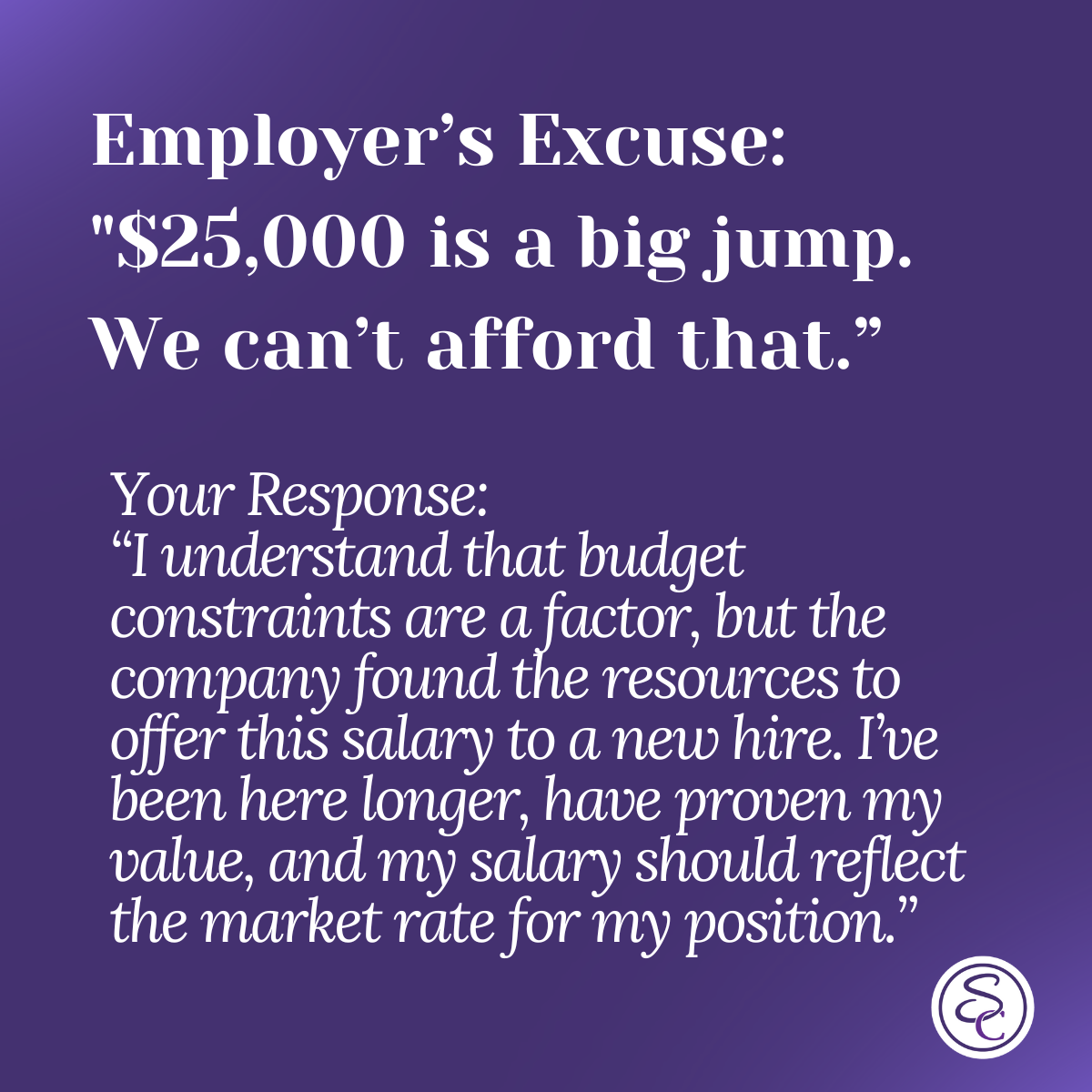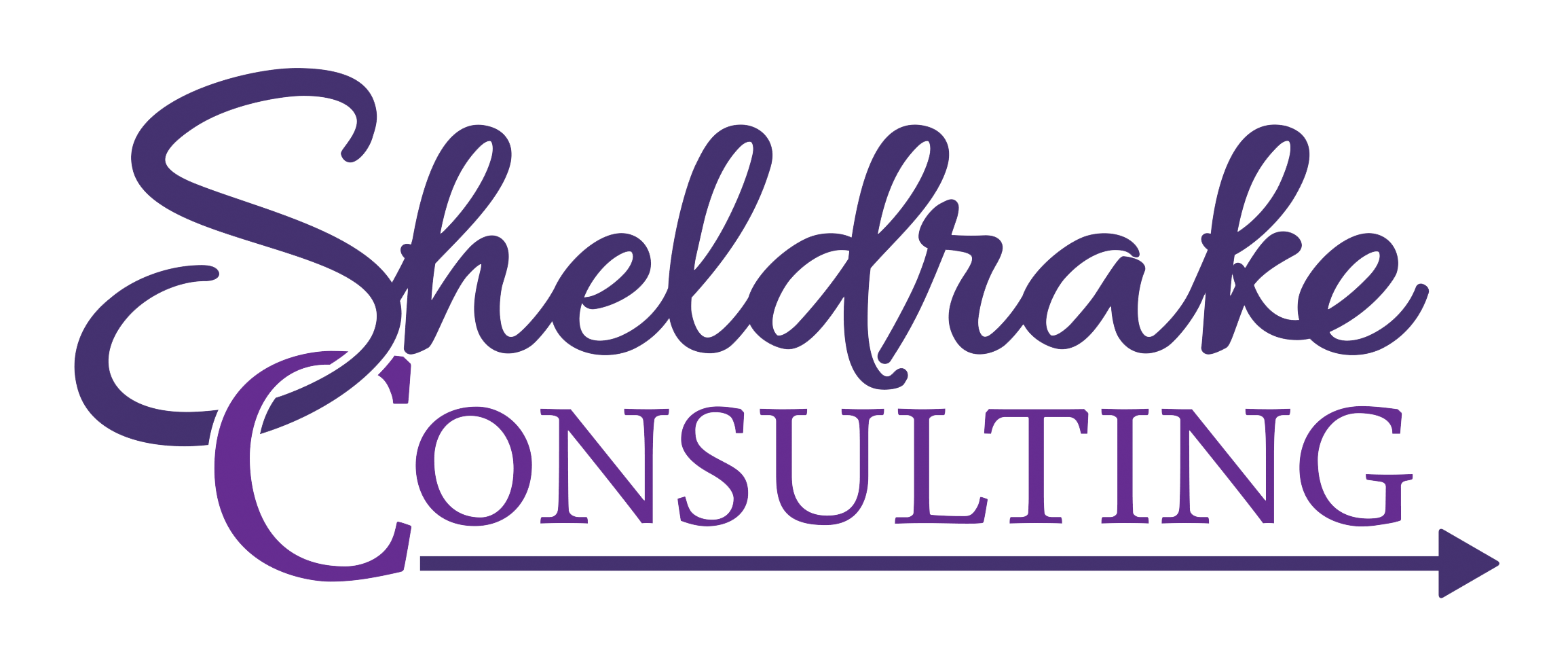Imagine this: You find out that your counterpart in another department—same job title, same responsibilities—is making $25,000 more than you. The reason? When their predecessor left, the company increased the salary to stay competitive in the market. But they didn’t adjust your pay.
You bring the pay inequity up to your boss, expecting a conversation about fairness and alignment. Instead, you hear: “$25,000 is a big jump. We just can’t get you there.”
So, what should you do?

Pay inequity can happen in any industry; sometimes, it is a sign of sexism, ageism, and other discrimination, but many times it can happen just like the example. Someone who has loyally stayed with their company gets left behind in salary while new hires receive a more competitive rate. As with any salary negotiation, you should ALWAYS come prepared with information.
Step 1: Gather Your Data
When you are dealing with pay inequity, it’s important to understand how you got there. Start by doing your research. Get a copy of both job descriptions so you can compare them. Are the roles truly equivalent? Are the responsibilities and workloads the same? If it’s a bigger company, find out how your roles and titles are tagged. Sometimes, the title designation is tied to salary, or there might be some sort of pay boost if the person has a certain degree or certification.

Then, look at the market salary data for your position. If you were to go out and find a similar role at a competitor, what salary ranges are you looking for? You can use salary websites like Glassdoor, Payscale, or LinkedIn Salary Insights to gather data. If this is a case of inflation and market changes, then it will be easier to make your argument.
Before you approach your employer, you need solid data to build a strong case. Your goal is to prove that your compensation is not aligned with either internal equity (how your pay compares to colleagues in the same role) or market value (how much companies are paying for your job externally).
Step 2: Prepare Your Counterargument
Once you have gathered your data, the next step is to anticipate pushback and be ready to counter it. Employers often resist salary adjustments, even when pay inequity is clear. Your job is to present a strong, fact-based argument that makes it harder for them to justify inaction.

Your boss may claim they can’t match the other salary, but the reality is: They made the budget work for your colleague. That means it’s possible. Here’s how to build your case:
Highlight Your Contributions
You want to avoid talking about “fairness” in your argument. Stick to the facts and your position and value to the company. Look at all the new tasks you have taken on since your hire date and/or last promotion/raise. Are you responsible for training other people? How long have you been with the company? Can you list your accomplishments or tie them to any company revenue goals?
Share Market Rates
Show that your request isn’t just personal; it’s aligned with industry norms. Employers want to remain competitive. Make sure to look at your organization’s current job postings for positions like yours. If they have already adjusted the pay for new hires, emphasize this. If you’ve been in the position for a long time, you can also add information about cost-of-living adjustments and inflation. Additionally, look at ALL of your benefits from your hire date. Have costs been creeping up with insurance benefits, parking costs, retirement matches, etc.? If you can paint a picture that this is an issue that should have been corrected a long time ago, versus a new jerk reaction, you will have a much stronger argument.
Calculate the Cost of Replacing You
One of the strongest points in a salary negotiation is showing your employer why it’s more cost-effective to keep you at a fair wage than to lose you. If you leave, replacing you will likely cost more than giving you the raise now. Mention the costs of hiring, onboarding, and lost productivity.
- Recruitment Costs: Hiring and onboarding a new employee often costs 50% or more of that person’s annual salary.
- Training & Lost Productivity: A new hire takes months to reach full productivity. If you’re already excelling, your company benefits more by keeping you.
- Company Culture & Morale: Pay inequity can lower morale and increase turnover. If you’ve discovered a wage gap, others may follow.
If your company has struggled with retention, mention it. The cost of replacing you is a compelling argument.
Many employers will resist pay inequity adjustments by downplaying fairness concerns. Instead of centering your argument on “this isn’t fair,” emphasize:
Step 3: Have a Direct Conversation
Schedule a formal meeting and approach it strategically:
Start with facts: “I’ve reviewed my compensation compared to market data and new hires, and I’d like to discuss adjusting my salary to be in line with my role and contributions.”
Present your case with confidence: “Given my experience, tenure, and impact on the company, I believe an adjustment to [$ amount] is appropriate.”
Ask a direct question: “How can we close this gap?” This forces leadership to engage in problem-solving rather than shutting down the conversation.
Identify the Company’s Likely Responses & How to Counter Them
💬 Employer’s Excuse: “$25,000 is a big jump. We can’t afford that.”
➡ Your Response: “I understand that budget constraints are a factor, but the company found the resources to offer this salary to a new hire. I’ve been here longer, have proven my value, and my salary should reflect the market rate for my position.”

💬 Employer’s Excuse: “The market has changed since you were hired. That’s why the new hire was offered a higher salary.”
➡ Your Response: “That makes sense, which is why it’s important that my pay also reflects current market conditions. If my role were posted today, I would expect my salary to match what’s competitive in today’s market.”
💬 Employer’s Excuse: “Raises are only given during annual reviews.”
➡ Your Response: “I appreciate that raises typically happen during reviews, but this isn’t about a standard increase—it’s about correcting a pay discrepancy. I’d like to discuss an adjustment outside of the normal cycle, given the situation.”
💬 Employer’s Excuse: “We value your work, but salaries are based on more than just tenure.”
➡ Your Response: “I completely agree, which is why I’m basing my request not just on tenure but on my contributions, responsibilities, and market value. If my work is valued, I’d like my compensation to reflect that.”
💬 Employer’s Excuse: “If we do this for you, we’d have to do it for everyone.”
➡ Your Response: “This is a case of a direct pay disparity for the same role, not a broad policy change. Addressing one individual inequity doesn’t set a precedent for across-the-board raises—it simply ensures that compensation is fair.”
Step 4: Evaluate Their Response
If leadership is unwilling to adjust your salary, you have options:
- Negotiate alternative benefits – If a salary bump isn’t possible now, ask for a timeline for raises, additional PTO, a title change, or bonuses.
- Example: “If a full adjustment isn’t possible right now, I’d like to discuss a phased approach or additional compensation in other ways, like a title change, a bonus, or extra PTO.”
- Document the conversation – If pay equity ever becomes a legal issue, documentation helps.
- Consider your next move – If your company won’t compensate you fairly, another employer might.
If your employer agrees to an increase—great! Make sure to:
- Ask for confirmation in writing (email or HR documentation).
- Confirm the timeline (when will it take effect?).
- Follow up if delays occur—don’t let the conversation fizzle out.
Step 5: Know Your Worth & Act Accordingly
While loyalty to a company can feel important, remember that your financial well-being matters more. If your employer values you, they’ll work to correct the pay gap. If they won’t, you have every right to look elsewhere.
The bottom line? Knowledge is power. If you discover a pay discrepancy, approach the conversation with confidence, facts, and a plan. And if your employer refuses to correct the pay gap and shows no willingness to adjust, it may be time to explore other opportunities. You now have market research, negotiation skills, and proof that your work is worth more—and another company may be willing to pay you accordingly.
If you’re facing a salary discrepancy and need help strategizing your next move, let’s talk. Schedule a consultation with me to gain the confidence and tactics you need to negotiate for what you deserve.

